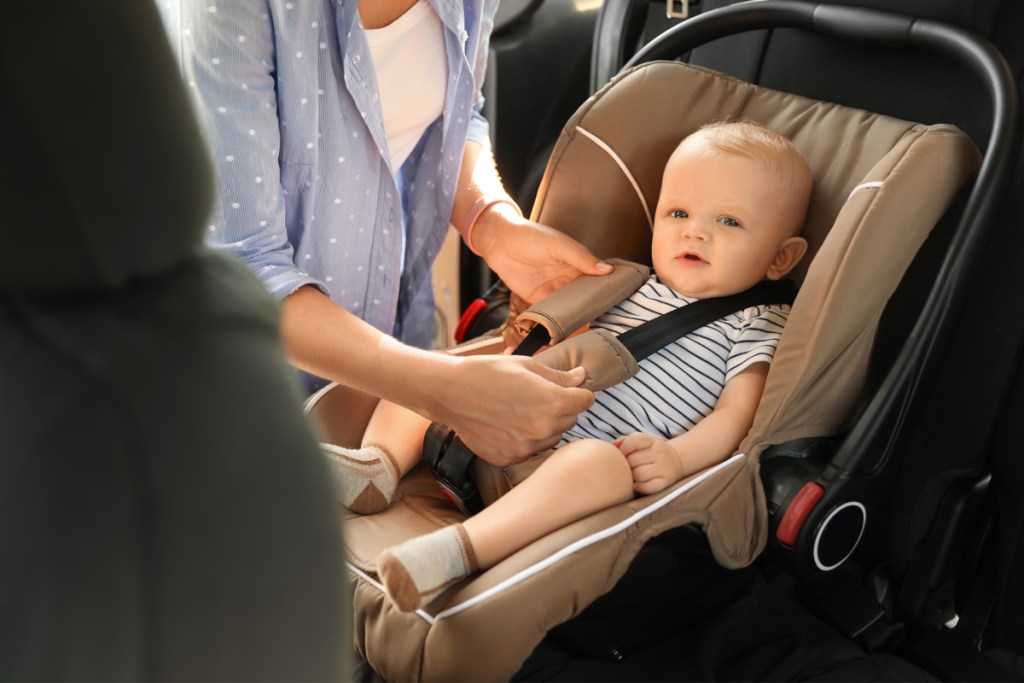
Everything is so expensive these days, and baby gear is certainly not cheap. A quality car seat is an essential part of your little one’s safety. Since kiddos need a car seat for a while, most parents want a car seat that grows with their child.
So, if you’re in the market for a car seat for your soon-to-be newborn or a sibling on the way, should you take a barely used car seat from a friend or reuse the one from your first child? The short answer is maybe. How long are car seats good for? Well, that depends, too, because car seats actually have an expiration date.

How long are car seats good for?
According to the American Academy of Pediatrics (AAP), when parents are shopping for a car seat for their infant or toddler, it’s important to choose one that’s not past its use-by date. That’s because car seats do have expiration dates. So, keep reading to learn how to find out a car seat’s expiration date.
Where to find a car seat’s expiration date?
Most car seats expire between 6 and 10 years from its manufacture date. Parents can find the manufacture and/or expiration date on the car seat’s manual or by examining the seat itself. The expiration date is typically located on the back or bottom of the seat. Car seat bases and booster seats also expire. Their expiration dates are usually in similar spots. If you can’t find a car seat’s expiration date, it’s best not to use it.
Why do car seats expire?
Wear and tear over time is the biggest reason why car seats expire. Just like any other item used regularly, a car seat’s effectiveness degrades through usage, aging, exposure to extreme temperatures, and sunlight. As a car seat’s effectiveness dwindles, so does the protection it is providing your child. This is the main reason why using a car seat past its expiration date is not recommended.
How to dispose of an expired car seat
If you do have an expired car seat, it’s important to dispose of it properly. You don’t want to donate a car seat that’s past its expiration date, sell it at a yard sale, or leave it on the curb. Target offers its shoppers a car seat trade-in program where participants receive a 20% coupon to be used for a new car seat. The old car seat is recycled. Other retail stores selling baby gear may offer a similar option. If you do throw an expired car seat away, be sure to remove the straps, padding, fabric, and metal. Mark the car seat as unusable with a marker before tossing it in the trash.
Note the car seat’s expiration date
It’s a good idea to write down the date of a car seat’s expiration when purchasing it. Take note of the date and write it on the manual or in the notes on your smartphone. This way, when you’re considering using it for a future sibling or giving it to a friend, you will know when it expires and how long it’s going to safely last.

Other ways to tell if a car seat isn’t usable
The expiration date is just one of the ways parents can tell if a car seat is still usable for their child or future siblings. If a car seat isn’t past its expiration date, there are other telltale signs that it is time to retire a car seat.
No instructions
A car seat has to be installed properly to safely protect your child in case of an accident. If you’re considering buying a used car seat or taking one from a friend, don’t do it unless it has the instruction manual. You might be able to find installation directions online, but it’s vital the car seat is installed and used correctly.
Car seats recalls
Car seats are recalled all the time for various reasons, and it’s important to know if a car seat you’re considering using has been recalled. Parents can check by heading to the National Highway Traffic Safety Administration (NHTSA) website or by calling 888-327-4236. If the car seat doesn’t have a model number, don’t use it. You can’t check on a recall without the model number.
Parts are missing
If you’re thinking about taking a used car seat and pieces are missing, forget it. You might be able to purchase the missing parts from the manufacturer, but not always. Check before purchasing it or taking it from a friend that you’ll be able to replace the missing pieces.
It’s been involved in an accident
If the family car has been involved in a serious accident, the car seat should be replaced immediately. A car seat involved in a fender bender or minor accident may still be usable, though most car seat manufacturers recommend replacing a car seat after any accident. The NHTSA considers an accident minor if:
- The car is drivable after the accident
- The car doors by the car seat were undamaged
- There weren’t any injuries
- The airbags did not deploy
- There isn’t visible damage to the car seat

Final thoughts on how long car seats are good for
Before dusting off the old family car seat or taking one from a friend, check the car seat’s expiration date. A car seat past the expiration date, which is usually 6 to 10 years, depending on the manufacturer, should be safely disposed of.



